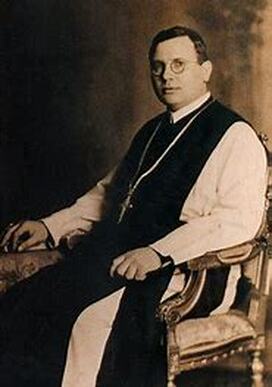They took me to the infamous secret police station at No. 60 Andrássy Street. The interrogation lasted eighteen hours with two short pauses. In the pauses they lit my face with highpowered lamps; two policemen saw to it that I would not close my eyes even for a minute.
The head of the Bureau of Investigation, whose name I never learned, told me that I had been under surveillance for two years and that they had followed every one of my steps. They had obtained irrefutable evidence about my criminal activities against the State. They told me that they intended to prove my crimes of organizing a conspiracy against the State, of espionage and of illegal dealings with foreign currency. They accused me of sending abroad twenty-four young members of the Order and of exhorting the Order to remain faithful to the Church even after Zirc had been suppressed. By doing this, they said, I wanted to weaken the power of the State and the new democratic regime. At the first interrogation they did not accuse me of conspiring to restore the Hapsburg monarchy, nor did they accuse me of anti-Semitism. These absurdities were invented later.
In the second hour of the interrogation, the colonel indignantly declared how insolent the hearsay was about the tortures done by the secret police. They would not even touch anybody. They had no intention of making a martyr of me. He gave his word “as a gentleman” to confirm all this. At this time, indeed, I could not even imagine that somebody of my age - I was 56 years old at the time - would be repeatedly beaten, kicked, tortured in all sorts of ways, and then given shots with chemicals that would deprive him of his free will.
They spent an awful lot of time telling me all sorts of slander about the personal lives of our bishops, the superiors of the religious orders and of other leading personalities of the Church. They declared who my lover was and made detailed statements about the sexual liaisons of the various bishops. That was followed by a long and detailed list of deviant sexual behavior attributed to these same persons. They, in fact, did not want to turn me into a martyr. To the contrary, they wanted to destroy my personality and turn me into a demoralized, humiliated non-person. They made no secret of their intent.
I was told how they planned to make the press in Hungary and abroad become a participant in this Satanic comedy. I received 72 hours to “think it over.” After that, if I would not cooperate, they would publish all those “facts” of which they had accused me. They would destroy not only my image but also the image of the Cistercian Order and the Church as a whole.
“I need not one minute of reflection,” I said. “There is nothing to think over.”
At the end of my first interrogation they accompanied me to the basement. On an ice-cold pavement floor, they stripped me naked: they wanted to see if I was hiding any items. They tore off the lining of my jacket, they broke off the sole of my shoe, they took off its heel. They took away my shirt buttons, my suspenders, even my eyeglasses.
In the prison cell there was only an incredibly dirty bunk bed. In the first two months I received no blanket. Later I got the kind of cover that one normally uses for horses. In the room the light was always on. Only the noise coming from the street enabled me to distinguish between night and day. I was expected to sit on the bunk bed without leaning back; only with permission was I allowed to lie down. I was expected to keep my hands outside the blanket. In my sleep I had to turn my head away from the wall, facing the light.


 RSS Feed
RSS Feed

